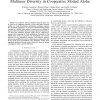Free Online Productivity Tools
i2Speak
i2Symbol
i2OCR
iTex2Img
iWeb2Print
iWeb2Shot
i2Type
iPdf2Split
iPdf2Merge
i2Bopomofo
i2Arabic
i2Style
i2Image
i2PDF
iLatex2Rtf
Sci2ools
103
click to vote
ICC
2007
IEEE
2007
IEEE
A Game Theoretic Solution for Exploiting Multiuser Diversity in Cooperative Slotted Aloha
— In multiuser systems, multiuser diversity gains can be achieved by assigning channels to users with higher channel quality. To avoid the extensive information exchange required for centralized approaches, we propose a distributed fair pricing strategy for a slotted Aloha system in which users act selfishly to improve their own utilities. Based on a game theoretic framework, we show that multiuser diversity gains can be achieved by appropriately designing the Nash equilibrium thresholds for the selfish users, such as to preserve the throughput and revenue achieved in the centralized schemes. The network enforces fairness among different users by employing a pricing policy that favors equal access probabilities. Our simulation results show significant multiuser diversity gains achieved in terms of energy consumption and/or spectral efficiency.
Communications | ICC 2007 | Multiuser Diversity Gains | Multiuser Systems | Significant Multiuser Diversity |
| Added | 02 Jun 2010 |
| Updated | 02 Jun 2010 |
| Type | Conference |
| Year | 2007 |
| Where | ICC |
| Authors | Cristina Comaniciu, Dandan Wang, Hlaing Minn, Naofal Al-Dhahir |
Comments (0)

